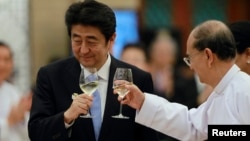RANGOON —
Japan on Sunday endorsed Burma's reform program by writing off nearly $2 billion in debt and extending new aid, some of which will help support an industrial zone being developed by Japanese firms near the commercial capital, Rangoon.
Japan agreed a year ago to forgive 176.1 billion yen ($1.74 billion) in arrears owed to it by Burma's government and, at the end of a three-day visit by Prime Minister Shinzo Abe, it said Burma had met the necessary conditions, including a series of political and economic reforms.
"Since both governments acknowledged the continuation of Burma's reform efforts, the government of Japan has decided to clear the said overdue charges," the Japanese Ministry of Foreign Affairs said in a statement.
Abe was the first Japanese leader to visit the Southeast Asian country in 36 years.
Unlike many countries Japan did not impose trade and financial sanctions on Burma during five decades of military rule, but it has dramatically scaled up its engagement since the poor but resource-rich country embarked on reforms two years ago under the quasi-civilian government of President Thein Sein.
The debt forgiveness was contingent upon Burma pushing ahead with reforms over the past year that included lifting media censorship, enacting a new foreign investment law and allowing more freedom for political activists and parties such as the National League for Democracy (NLD).
Abe met with NLD leader and Nobel Peace Prize winner Aung San Suu Kyi during his trip.
On Saturday he visited the port of Thilawa, the site of the future industrial zone, 25 km (15 miles) south of Rangoon.
As part of 51.05 billion yen in new aid announced on Sunday, Japan will provide up to 20 billion yen for the Thilawa project, repayable over 40 years at 0.01 percent interest. The money will help with electricity infrastructure in the area and an expansion of the port.
Other projects will help increase the power supply elsewhere in the country and develop infrastructure in rural areas.
There was no reference in the various statements to another industrial project in Dawei, by the border with Thailand, being developed by Italian-Thai Development Pcl.
Initial funding of $8.5 billion has proved elusive and the Thai government has sought Japanese help.
Prime Minister Yingluck Shinawatra was in Japan this week and she said in a weekly televised broadcast on Saturday that investors there had shown strong interest. Thai officials had hoped for signs of progress during Abe's visit to Burma. ($1 = 101.1850 Japanese yen)
Japan agreed a year ago to forgive 176.1 billion yen ($1.74 billion) in arrears owed to it by Burma's government and, at the end of a three-day visit by Prime Minister Shinzo Abe, it said Burma had met the necessary conditions, including a series of political and economic reforms.
"Since both governments acknowledged the continuation of Burma's reform efforts, the government of Japan has decided to clear the said overdue charges," the Japanese Ministry of Foreign Affairs said in a statement.
Abe was the first Japanese leader to visit the Southeast Asian country in 36 years.
Unlike many countries Japan did not impose trade and financial sanctions on Burma during five decades of military rule, but it has dramatically scaled up its engagement since the poor but resource-rich country embarked on reforms two years ago under the quasi-civilian government of President Thein Sein.
The debt forgiveness was contingent upon Burma pushing ahead with reforms over the past year that included lifting media censorship, enacting a new foreign investment law and allowing more freedom for political activists and parties such as the National League for Democracy (NLD).
Abe met with NLD leader and Nobel Peace Prize winner Aung San Suu Kyi during his trip.
On Saturday he visited the port of Thilawa, the site of the future industrial zone, 25 km (15 miles) south of Rangoon.
As part of 51.05 billion yen in new aid announced on Sunday, Japan will provide up to 20 billion yen for the Thilawa project, repayable over 40 years at 0.01 percent interest. The money will help with electricity infrastructure in the area and an expansion of the port.
Other projects will help increase the power supply elsewhere in the country and develop infrastructure in rural areas.
There was no reference in the various statements to another industrial project in Dawei, by the border with Thailand, being developed by Italian-Thai Development Pcl.
Initial funding of $8.5 billion has proved elusive and the Thai government has sought Japanese help.
Prime Minister Yingluck Shinawatra was in Japan this week and she said in a weekly televised broadcast on Saturday that investors there had shown strong interest. Thai officials had hoped for signs of progress during Abe's visit to Burma. ($1 = 101.1850 Japanese yen)
